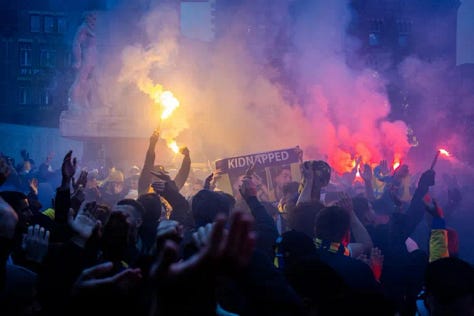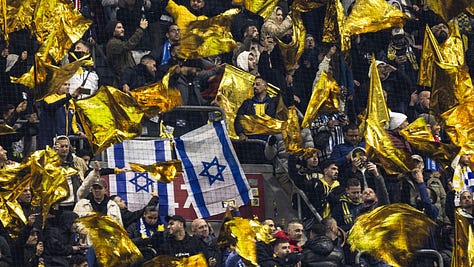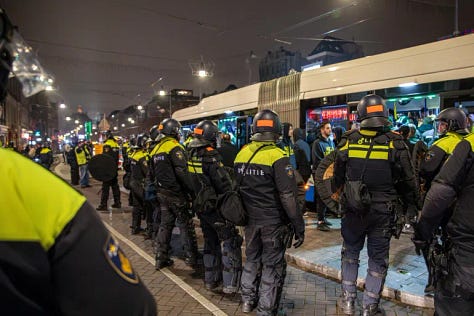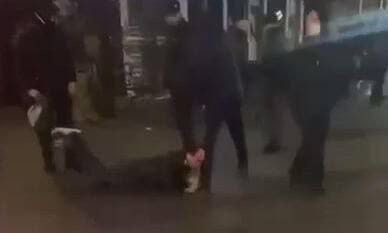Street Justice and State Spin: How Israel Frames Anti-Genocide Resistance as “Antisemitism”
How Global Resistance to Israeli Provocation in Amsterdam Exposes the Export of Colonial Violence and the Urgent Need to Reclaim the Narrative







“They began [tearing down flags at] houses of people in Amsterdam with Palestinian flags, so that’s actually where the violence started,” Amsterdam City Councilman Jazie Veldhuyzen told Al Jazeera on Friday. “As a reaction, Amsterdammers mobilised themselves and countered the attacks that started on Wednesday by the Maccabi hooligans.”
The recent events in Amsterdam, where Israeli football fans from Maccabi Tel Aviv instigated violence by tearing down Palestinian flags and mockingly referencing murdered children in Gaza, underscore an unsettling truth: this behavior is far from isolated fan violence. Instead, it is symptomatic of an entrenched entitlement within segments of Israeli society—an entitlement cultivated and validated by the Israeli state through policies that have normalized racism and sanctioned violence against Palestinians for decades. This entitlement, bolstered by ongoing international impunity, allows Israeli citizens, including former and current soldiers, to act aggressively and provocatively in foreign contexts, knowing their actions will likely be recast in narratives of Israeli victimhood rather than scrutinized for their explicit aggression.
Rather than holding accountable those who vandalized and incited, Israeli media and officials quickly reframed the events to emphasize Israel’s own “victimization.” The Israeli government, adept in transforming any confrontation into an allegation of “antisemitism” or an “attack on Israel,” thereby deflects the focus from what actually transpired: Israeli citizens engaging in provocative, racist behavior abroad, emboldened by the state’s genocidal actions and political power. By reframing justified responses to their provocations as antisemitism, Israel manipulates the perception of the incident, masking the root cause—an aggressive settler-colonial mindset that manifests in openly hostile acts against Palestinians and their supporters.
This tactic is deliberate and common, woven into a larger strategy that Israel has perfected to avoid accountability. When faced with global condemnation for its actions in Palestine or elsewhere, the state reframes the issue, casting itself as the victim of unwarranted aggression or antisemitic bias. This narrative not only redirects international scrutiny away from Israel’s policies but also ensures that any resistance, whether in Gaza or on the streets of Amsterdam, is perceived as irrational hatred rather than a reaction to colonial violence. By exploiting genuine global concerns about antisemitism, Israel repurposes those fears to shield itself from condemnation, preventing the world from fully engaging with the realities of its actions and policies that are widely condemned as oppressive, violent, and racist.
Middle Eastern Eye: Maccabi Tel Aviv hooligans who gathered at Dam Square in Amsterdam sparked tensions by igniting a confrontation with pro-Palestine supporters on Wednesday.
Provocation as Policy: A History of Violence Beyond Borders
The provocations in Amsterdam reveal a troubling, recurring pattern within Israeli society—a pattern where aggression and entitlement are exported beyond Israel’s borders, backed by the state’s machinery and propaganda. Reports detail that Israeli fans of Maccabi Tel Aviv did more than simply attend a soccer match; they carried out a series of explicitly antagonistic acts: tearing down Palestinian flags, chanting “Fuck Palestine” and “Let the IDF win to fuck the Arabs,” and reportedly mocking the deaths of children in Gaza. According to Al-Mayadeen’s correspondent, these individuals included former soldiers, some recently returned from Gaza, suggesting that this aggression was not simply fan-related zeal but reflected a broader cultural and political ethos shaped by state-backed occupation and colonial violence.
The presence of soldiers among the fans is significant, indicating that these were not mere bystanders but individuals actively engaged in or supportive of Israel’s policies of repression in Palestine. They mocked and removed Palestinian flags that had been displayed on Dutch homes for months in a show of solidarity with Gaza. This act of destruction is emblematic of a mindset instilled by a state that has long sanctioned the erasure of Palestinian identity, history, and even physical presence. As historian Ilan Pappé observes, “The state encourages the idea that Palestinians are the enemy, not just in Gaza but wherever they are. This attitude extends beyond borders, as we see in Amsterdam—a colonial mindset exported.”
Such provocations are far from isolated incidents and follow a consistent pattern of entitlement among Israelis abroad, emboldened by state policies that normalize racism and aggression against Palestinians. Israeli citizens engaging in similar acts around the world often operate with confidence that any backlash or resistance will be swiftly rebranded by their government as “terrorism” or “antisemitism.” As journalist Gideon Levy has noted, “In Israel, they are raised to see Palestinians and Arabs as inherently violent, as a threat. So when they act aggressively abroad, it’s seen as acceptable because they believe their aggression is self-defense. And the state reinforces this.” This cultivated entitlement has consequences not only for Palestinians within the Occupied Territories but also for Palestinians and their allies in diaspora communities worldwide.
This tactic of framing aggression as victimhood is not new. For decades, the Israeli government has used a well-honed propaganda strategy to portray its citizens and soldiers as perpetual victims, irrespective of the violence they enact. This inversion of reality allows Israel to deflect scrutiny of its policies, presenting every confrontation, whether on the ground in Gaza or in the streets of Amsterdam, as “an attack on Jews” or “antisemitism,” shifting blame to the opposition. By doing so, Israel ensures that any reaction to its provocations—whether by Moroccans and Dutch locals defending their community or Palestinians asserting their rights—can be dismissed as irrational hate rather than legitimate resistance to colonial violence.
When Moroccans and other Dutch locals confronted the Israeli fans and protected Palestinian flags, Israeli discourse quickly shifted to labeling them as “violent extremists.” Israeli media characterized these locals as dangerous, effectively recasting the scene of Palestinian solidarity into an alleged “antisemitic” uprising. This narrative manipulation serves a strategic purpose: by framing justified acts of resistance to Israel’s provocations as extremism, Israel shifts the focus from its own policies of violence to the alleged irrationality of its opponents. In the words of sociologist and activist Jeff Halper, “The genius of Israeli propaganda is that it creates the conditions for violence, provokes it, and then presents itself as the innocent victim when those conditions explode into conflict.”
In the case of Amsterdam, Israel’s framing of the incident as an antisemitic attack is a deliberate effort to obscure its provocations and avoid accountability for actions widely condemned as violent and racist. This tactic of rebranding aggression as victimization not only silences dissent but also reinforces a dangerous precedent, allowing Israeli individuals and soldiers to engage in internationally condemned actions without facing the consequences.
Social media quote: “The huge majority of these Israeli thugs were in and still serve in the Terrorist Israeli army!
ALL of them are war criminals!”
Weaponizing Antisemitism: From Protection to Propaganda
Israel’s use of antisemitism as a shield against criticism is a powerful tactic rooted in the genuine, globally resonant condemnation of antisemitism itself—a condemnation shaped by centuries of persecution against Jewish communities, especially the horrors of the Holocaust. However, by conflating criticism of Israel’s policies and actions with antisemitic hatred, Israel effectively distorts this moral imperative. When people react with justified anger toward Israeli soldiers’ provocations, labeling such reactions as “antisemitic” weaponizes a critical distinction: political opposition to Israel’s actions becomes equated with racist hatred of Jews. This deliberate conflation erases the line between political resistance and actual racism, creating a false dichotomy that frames Israel as a perennial victim while obscuring its role as an aggressor.
As Jewish historian and activist Norman Finkelstein has stated, “The Israeli government has exploited the history of antisemitism, not to protect Jews, but to immunize itself from legitimate criticism.” By branding protests against its actions in Gaza, Lebanon, and, as we saw in Amsterdam, in the Netherlands as antisemitic, Israel strategically shuts down opposition. This conflation is designed not merely to protect Israel’s image but to stifle any international scrutiny, silencing voices that speak out against what many view as acts of colonial violence and apartheid. When people are labeled antisemitic for supporting Palestinian rights, Israel manipulates legitimate historical traumas for a propaganda advantage, turning the moral consensus against antisemitism into a tool to defend its policies of occupation and violence.
This strategy is fundamentally about control. By framing political criticism as antisemitism, Israel ensures that regardless of the extremity of its actions—be it airstrikes on densely populated Gaza neighborhoods, demolitions in the West Bank, or provocations on foreign soil—critics are easily dismissed as bigots. Historian Ilan Pappé notes, “In Israel’s narrative, to oppose Zionism is to oppose the Jewish people. It’s a narrative constructed to equate the two, making any criticism of Israel an attack on Jews. This framing shuts down dialogue and prevents accountability.” In Amsterdam, this framing meant that Dutch locals and Moroccans, who defended their communities against overt provocations, could be dismissed in Israeli media as irrational extremists motivated by ethnic hatred.
The manipulation of antisemitism to shield state violence is especially damaging because it exploits the legitimate traumas and fears of Jewish history. By invoking these traumas, Israel masks its policies in the language of victimhood, transforming acts of aggression into self-defense. This tactic not only absolves Israel of guilt but also recasts Palestinian solidarity movements as inherently malicious. As journalist Gideon Levy remarks, “Israel uses antisemitism as a bludgeon, wielding the memory of our people’s suffering to protect actions that, in another context, would be condemned by the very societies we now accuse of antisemitism.” In this narrative, any solidarity with Palestinians, any critique of Israeli policy, becomes framed as an affront to Jewish identity itself, rendering meaningful critique almost impossible.
For Palestinians and their allies, this manipulation is more than just rhetorical; it has real consequences. By consistently labeling resistance as antisemitic, Israel not only stifles support for Palestinian rights but also places those who stand in solidarity with Palestine at risk of social, legal, and political repercussions. The tactic builds a narrative that characterizes pro-Palestinian activism as hate-filled rather than justice-oriented, casting activists as dangerous figures to be silenced or penalized. As Israeli journalist Amira Hass poignantly states, “When Israel accuses its critics of antisemitism, it’s a diversion, a way to keep attention away from the core issue—our treatment of Palestinians. It’s a tactic that hides the occupation behind the legacy of Jewish suffering.”
By wielding antisemitism as propaganda, Israel not only damages efforts for Palestinian liberation but also dilutes the very fight against real antisemitism. This approach risks eroding the global commitment to combating antisemitism by transforming it into a political weapon rather than a moral imperative.
“When sports become a stage for hate, the real heroes are those who stand against it. The Arab community in Amsterdam reminded the world that justice has no borders. Extremist fans of Maccabi spread hate, but the power of unity and resistance won.”
Street Justice as Accountability in a World of Impunity
When Israeli fans tore down Palestinian flags, chanted incendiary slurs, and disrespected a moment of silence for flood victims, it wasn’t the state or authorities who intervened; it was Dutch and Moroccan locals who stood up. This response—what some might call “street justice”—wasn’t an unprovoked act of violence but rather a form of spontaneous accountability. In Amsterdam, residents and supporters of Palestinian rights found themselves compelled to defend their communities and symbols, mirroring the daily reality of resistance Palestinians face under occupation. This street-level response arose because Dutch authorities and European institutions failed to take meaningful action against Israeli provocateurs, effectively leaving the locals to respond in real time to Israel’s exported aggression.
Dutch authorities, however, responded by arresting more pro-Palestinian supporters than Israeli instigators. This discrepancy underscores a broader failure of European institutions to adequately address the provocations and racism perpetuated by Israeli citizens abroad. Instead of holding the instigators accountable, these institutions seem more comfortable containing the reactions of those targeted by Israeli aggression, revealing an institutional bias that aligns more closely with appeasing Israel than with upholding justice. As historian Ilan Pappé notes, “The West often speaks of democracy and justice but turns a blind eye when these principles threaten to expose Israel’s actions. The same blind spot is apparent in Europe’s handling of events like Amsterdam.”
Meanwhile, the Israeli government played up the incident in the media, using hyperbole and inflammatory language to spin the event as a crisis requiring urgent action. Israeli media reported “missing persons” and the possibility of kidnappings, pushing for emergency evacuations despite Dutch police confirming there were no hostages or disappearances. As Israeli news site Ynet speculated, “We still have no answers about those who are unaccounted for—could they have been harmed in these antisemitic clashes?” This exaggerated language stoked public fears and further fueled the Israeli government’s victim narrative, painting Israelis as the sole sufferers of irrational hatred and ignoring the provocative behavior that incited the incident in the first place.
The swift push for evacuations reveals a deeper, systemic entitlement—a belief that Israelis can act provocatively or even violently abroad and expect not only their government’s protection but also international sympathy. This entitlement is bolstered by an international alliance that reframes any repercussions as unwarranted attacks. As writer Gideon Levy observes, “There’s an arrogance in Israeli society that believes any resistance or response to its provocations is illegitimate. This mindset doesn’t just operate in the Occupied Territories; it follows Israelis wherever they go, creating the sense that they are entitled to act as they please without facing consequences.”
In Amsterdam, when faced with resistance to their provocations, many Israeli fans expected this safety net to insulate them. Instead, they encountered a community unwilling to tolerate their aggression. This spontaneous resistance forced a momentary recalibration, a pause that highlighted the gap between how Israel views its citizens’ actions abroad and how the rest of the world perceives them. For many pro-Palestinian supporters in Amsterdam, this act of street justice represented a form of immediate accountability—something they likely see as missing in international responses to Israel’s policies of aggression and occupation.
Moreover, the Israeli government’s quick shift to victim narratives emphasizes a broader trend in how Israeli actions are justified and excused on the international stage. While Dutch authorities remained passive in the face of Israeli provocations, arresting those defending Palestinian symbols instead of those instigating violence, the real justice came not from the state but from the community itself. As Palestinian activist Mohammed El-Kurd writes, “Israel operates with the assumption that no matter how brazen its actions, the world will side with it. But on the ground, people are showing that this entitlement has limits. This kind of resistance shows there is a line.”
In this context, street justice becomes an act of reclaiming agency—a refusal to allow entitlement to trump accountability. For the Palestinian community and its supporters, moments like these reveal that while state institutions may protect Israel’s provocations, people are willing to stand up against them. Street justice in Amsterdam was not just a reaction to a local conflict; it was an echo of the global resistance against colonial violence, a reflection of the determination to stand in solidarity with Palestine even when official channels fail to provide justice.
Reclaiming the Narrative: Recognizing Israel’s Genocidal Intent
The behavior displayed by Israeli fans in Amsterdam is not an aberration but a direct export of the violence Palestinians endure daily under occupation. In Palestine, Israeli soldiers and settlers often desecrate Palestinian homes and destroy property while mocking and dehumanizing the people whose land they occupy. This behavior is part of a settler-colonial mindset that seeks to erase Palestinian identity and asserts Israeli dominance not just in occupied Palestine but wherever they encounter symbols of Palestinian solidarity. Historian Ilan Pappé explains, “This is not just about military occupation; it’s about erasing the existence of an entire people, an intent that permeates Israeli policy, both in Palestine and wherever Israel feels its interests are challenged.” The events in Amsterdam are an extension of this intent, demonstrating that the aggression normalized within the Israeli state finds expression even on foreign soil.
These acts—tearing down Palestinian flags, chanting about the deaths of Palestinian children, and treating the symbols of Palestinian resistance with hostility—mirror daily incidents in the West Bank and Gaza. Israeli settlers routinely target Palestinian homes and land with vandalism and violence, often under the watchful protection of the Israeli military. For Palestinians, this behavior is a familiar language of oppression—a constant assertion that their lives, homes, and histories are disposable. As Palestinian writer Mohammed El-Kurd articulates, “The violence Palestinians face isn’t just physical; it’s symbolic, cultural. Every demolished home, every desecrated flag, every hateful chant is part of a strategy to erase us from our own land and deny our right to exist.”
The response in Amsterdam by Moroccan and Dutch locals was a clear and courageous rejection of Israel’s exported violence, a powerful statement that colonial aggression is unwelcome in their streets. This act of solidarity was not an isolated outburst but part of a global movement that refuses to normalize or accept Israeli entitlement to occupy spaces—whether in Palestine or elsewhere—with a presumption of impunity. This local, on-the-ground resistance represents a message to Israel that their dominance will not go unchallenged outside their borders. As Ali Abunimah, co-founder of The Electronic Intifada, has observed, “The world is waking up. When people are pushed, when they see injustice, they will stand up, and that’s exactly what’s happening around the world now. People refuse to let Israel act as if Palestinian lives don’t matter.”
Israel’s attempts to recast the events in Amsterdam as acts of “antisemitic violence” strategically obscure the true narrative: a global, growing resistance to its policies of violence and domination. By labeling any resistance as antisemitic, Israel not only manipulates public perception but also obscures the fact that this resistance is fundamentally about standing against oppression. This framing fails to account for the widespread solidarity with Palestinians who are subjected to violence that is not only physical but systemic and genocidal. By obscuring these realities, Israel seeks to silence critics and stifle any narrative that might reveal the oppressive nature of its policies.
Yet, despite Israel’s efforts to reframe the Amsterdam confrontations, the reality remains clear. The backlash Israeli fans encountered was not driven by antisemitism but by opposition to a system that has repeatedly demonstrated genocidal intent toward Palestinians. The narrative Israel attempts to impose fails to resonate with those who recognize the violence inflicted daily on Palestinian lives. As academic and author Noura Erakat has said, “The global support for Palestinian rights is rooted in a clear understanding of what this occupation entails—displacement, erasure, and death. To label that support as hate is to deny the truth of what Palestinians experience every day.”
Reclaiming the narrative means acknowledging that the events in Amsterdam are symptomatic of a larger, systemic issue: an Israeli state that has normalized violence and dehumanization as tools of control, both in Palestine and in its international engagements. The aggression met with resistance in Amsterdam is, at its core, a reflection of an emboldened settler-colonial ideology. For many, the confrontations represented a line drawn in solidarity, an assertion that while the international community may be silent, ordinary people recognize and resist this exported colonial aggression. Palestinian-American activist Linda Sarsour states, “Solidarity is not just about sharing a hashtag. It’s about saying, ‘This violence is not welcome here, or anywhere.’ We have a duty to stand up to colonial violence, whether it’s in Palestine or Amsterdam.”
By refusing to allow Israel to dictate the narrative, we see through its deflections and acknowledge the root of these confrontations—not antisemitism, but a global, moral stance against an occupying power whose violence transcends borders. In this reclamation, the message to Israel becomes clear: its policies of erasure and violence will continue to be met with unwavering solidarity for Palestinian rights and dignity, as communities worldwide increasingly stand in resistance to a system they recognize as unjust.





